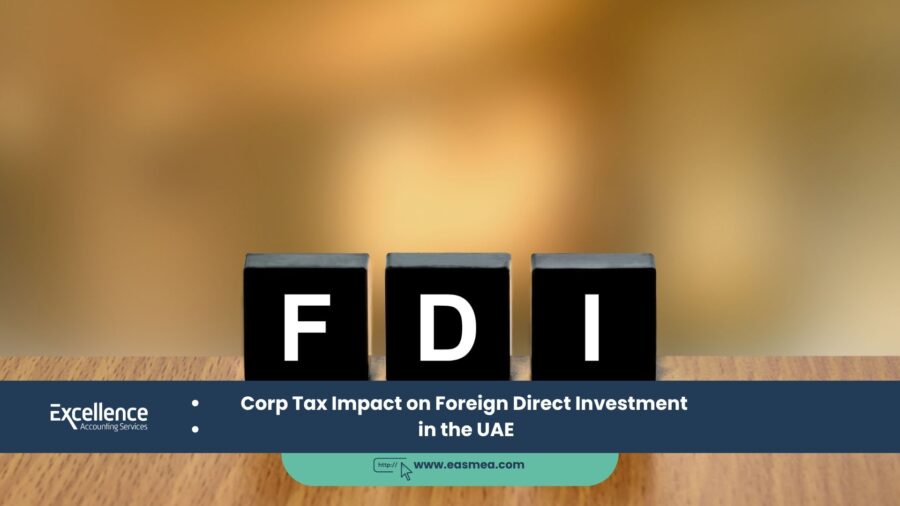The UAE Corporate Tax: A Strategic Catalyst for Foreign Direct Investment (FDI)
For decades, the UAE’s economic narrative to the world was elegantly simple: a dynamic, pro-business hub with zero corporate tax. This powerful incentive, combined with world-class infrastructure and strategic location, made it an unparalleled magnet for Foreign Direct Investment (FDI). The recent introduction of a federal Corporate Tax regime marks the most significant fiscal reform in the nation’s history, prompting a crucial question from boardrooms worldwide: Has the UAE’s FDI appeal diminished?
- The UAE Corporate Tax: A Strategic Catalyst for Foreign Direct Investment (FDI)
- From Tax Haven to Global Hub: The Strategic Rationale
- Analyzing the Impact on FDI: A Balanced View
- How Excellence Accounting Services (EAS) Guides Foreign Investors
- Frequently Asked Questions (FAQs) on Corporate Tax and FDI
- Investing in the UAE? Navigate the New Tax Landscape with an Expert Partner.
The answer, contrary to initial assumptions, is a resounding no. The implementation of Corporate Tax is not a retreat from the UAE’s pro-business stance, but rather a strategic evolution. It is a calculated move to transition the economy from a model based on tax incentives to one built on the more enduring pillars of stability, transparency, and global integration. By aligning with international standards, such as the OECD’s Base Erosion and Profit Shifting (BEPS) framework, the UAE is future-proofing its economy and enhancing its reputation as a mature, credible, and serious place to do business.
This article provides an in-depth analysis of how the new tax landscape will shape FDI flows into the UAE. We will explore how this shift presents new challenges for investors but, more importantly, how it unlocks powerful new opportunities and solidifies the UAE’s position as a premier global investment destination for discerning, long-term capital.
Key Takeaways
- A Strategic Pivot, Not a Deterrent: The Corporate Tax enhances the UAE’s global reputation, shifting its appeal from a “zero-tax” haven to a stable, compliant, and transparent economic hub.
- Globally Competitive Rate: At 9%, the UAE’s Corporate Tax rate remains one of the most competitive in the world, significantly lower than in many other major economies and financial centers.
- Free Zones Remain a Powerful Incentive: The preservation of a 0% tax rate on “Qualifying Income” for Free Zone entities ensures that the UAE retains a potent, targeted incentive for export-oriented and strategic industries.
- Certainty Breeds Confidence: A clear, modern, and internationally recognized tax law provides the long-term predictability that serious institutional investors crave, which is often more valuable than a zero-tax regime with potential for future changes.
- Enhanced Treaty Benefits: A formal tax system strengthens the UAE’s ability to leverage its vast network of over 100 Double Taxation Avoidance Agreements (DTAAs), providing tangible benefits to MNEs.
From Tax Haven to Global Hub: The Strategic Rationale
Understanding the impact on FDI requires first understanding the “why” behind the tax. This was not a purely revenue-driven decision. The primary motivators were strategic:
- Alignment with Global Standards: The move brings the UAE in line with the OECD’s global minimum tax rules under BEPS Pillar Two, ensuring large multinationals are taxed appropriately and preventing the UAE from being labeled as a non-cooperative jurisdiction.
- Boosting Transparency and Credibility: A formal tax system combats perceptions of the UAE as a “tax haven” and enhances its standing with international financial institutions, regulatory bodies, and institutional investors.
- Economic Diversification: While not the primary driver, the tax creates a stable, non-oil-based revenue stream for the government, funding public services and infrastructure projects that further benefit businesses.
Analyzing the Impact on FDI: A Balanced View
The new regime introduces new considerations for foreign investors, but the net impact is overwhelmingly positive for the country’s long-term FDI proposition.
New Considerations and Challenges for Investors
- Sophisticated Financial Modeling: Investors must now incorporate a 9% tax rate into their financial projections. This requires more detailed feasibility studies and business plans to accurately forecast post-tax returns on investment.
- Heightened Compliance Requirements: Foreign entities must navigate new administrative responsibilities, including tax registration, maintaining IFRS-compliant accounting records, calculating taxable income, and filing annual tax returns. This necessitates robust internal controls or reliance on expert partners.
- Transfer Pricing Scrutiny: For Multinational Enterprises (MNEs), a key challenge is adhering to the UAE’s new transfer pricing regulations. All cross-border and domestic transactions with related parties must be priced at “arm’s length,” requiring significant documentation and justification.
- Tax in Due Diligence: FDI through mergers and acquisitions (M&A) now requires a far more rigorous tax due diligence process to identify and quantify any pre-existing tax liabilities of the target company.
How Corporate Tax Ultimately Strengthens the UAE’s FDI Appeal
- Predictability and Long-Term Stability: A codified tax law provides a clear and predictable framework. For serious, long-term investors, this legal certainty is often more attractive than a zero-tax environment that could be subject to sudden international pressure or policy shifts.
- The Power of the 9% Rate: In a global context, a 9% rate is exceptionally competitive. It is substantially lower than the rates in Singapore (~17%), Ireland (12.5%), the UK (~25%), and the average OECD rate (~23%). This maintains a significant financial advantage.
- The Free Zone “Tax-Free” Corridor: The decision to retain a 0% tax rate on Qualifying Income for Free Zone businesses is a masterstroke. It allows the UAE to meet global standards while preserving its most famous incentive for the export-focused businesses that have long flocked to its shores. Strategic company formation in a Free Zone remains a compelling option.
- Unlocking Double Taxation Treaty Benefits: The existence of a formal Corporate Tax unlocks the full potential of the UAE’s extensive DTAA network. This directly benefits foreign investors by providing clear mechanisms to prevent their profits from being taxed twice—once in the UAE and again in their home country.
The introduction of Corporate Tax is the UAE’s declaration to the world that it is competing not as a low-cost, zero-tax destination, but as a high-value, stable, and globally integrated economic powerhouse.
How Excellence Accounting Services (EAS) Guides Foreign Investors
For foreign entities navigating the new landscape, expert local guidance is critical. EAS provides a comprehensive suite of services designed to de-risk market entry and optimize operations under the new tax regime.
- Market Entry & Structuring Strategy: Our business consultancy team advises on the optimal legal structure—Mainland vs. Free Zone—based on your business model to maximize tax efficiency.
- End-to-End Corporate Tax Compliance: We manage the entire tax lifecycle for our foreign clients, from registration and impact assessment to meticulous calculation and filing, through our dedicated UAE Corporate Tax services.
- Transaction Advisory and Due Diligence: We support FDI through M&A by conducting thorough financial and tax due diligence to ensure you are making a sound investment.
- Outsourced CFO Services: For new entrants, our CFO services provide the high-level financial stewardship needed to manage capital, ensure compliance, and drive growth without the cost of a full-time executive.
Frequently Asked Questions (FAQs) on Corporate Tax and FDI
For high-quality, long-term investors, it has arguably made it more attractive. While the simple “zero tax” hook is gone, it has been replaced by a value proposition of stability, transparency, global compliance, and a still-highly-competitive 9% rate. This attracts more sustainable and substantive investment.
It allows foreign companies to use the UAE as a manufacturing, logistics, or services hub for the wider region and the world without incurring tax on their export profits. A company can set up in a Free Zone, import raw materials, process them, and export finished goods, with all profits from these “Qualifying Activities” taxed at 0%.
The choice depends on your activities. If the HQ’s primary role is managing other group companies, holding shares, and providing services to entities outside the UAE, a Free Zone may be ideal to benefit from the 0% rate on Qualifying Income. If the HQ needs to be deeply integrated with the UAE Mainland economy and have a physical presence in a city center, a Mainland entity might be more suitable, subject to the 9% tax.
DTAAs prevent your profits from being taxed twice. For example, if your UAE subsidiary pays a dividend to your parent company in Germany, the DTAA may reduce or eliminate any withholding tax. The CT law provides the “substance” needed for UAE companies to be recognized as tax resident, allowing them to claim these treaty benefits effectively.
The most common mistakes are underestimating the need for IFRS-compliant bookkeeping from day one, failing to properly document transfer pricing policies for related party transactions, and misinterpreting the complex rules around Qualifying Income in Free Zones.
It might. If your company has a “Permanent Establishment” (PE) in the UAE, its profits attributable to that PE are taxable. A PE can be created through a fixed place of business or even through the activities of a dependent agent. This is a complex area requiring careful analysis of your business model.
The management fee must be at “arm’s length,” meaning it must be equivalent to what an independent company would charge for the same services. You will need to prepare detailed “transfer pricing documentation” to justify the amount, showing how it was calculated and proving that it reflects the fair market value of the services provided.
Yes. A major advantage of the UAE system is that there is no withholding tax on the repatriation of profits and dividends to foreign shareholders. After you have paid your 9% Corporate Tax on profits, you can remit the remaining amount abroad without further taxes in the UAE.
You must demonstrate that your company has a genuine operational presence. This means having an adequate number of qualified employees, sufficient physical assets (like an office or warehouse), and incurring an adequate level of operating expenditure in the UAE. Core income-generating activities must be conducted in the country.
Your first step, even before making the investment, should be to conduct a tax impact assessment with a qualified advisor. This involves modeling the tax implications on your business plan, deciding on the optimal legal structure (Mainland vs. Free Zone), and establishing a clear roadmap for compliance from day one.
Conclusion: The Dawn of a New Investment Era
The UAE’s Corporate Tax regime is a bold statement of intent. It signals the nation’s evolution from a burgeoning market fueled by tax incentives to a mature, stable, and transparent global economic center. For foreign investors, this new landscape demands a more sophisticated approach, one that prioritizes strategic planning and robust compliance. However, the rewards are greater than ever: the opportunity to invest in a predictable, credible, and globally integrated economy that still offers one of the most competitive fiscal environments in the world. The era of easy tax wins may be over, but the era of smart, sustainable, and strategic investment in the UAE has just begun.




